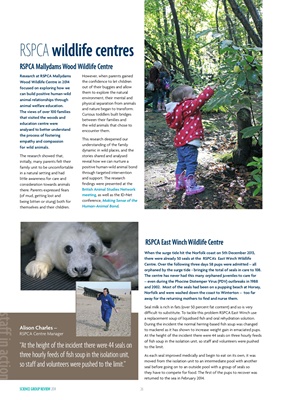
SCIENCE GROUP REVIEW 2014 26
RSPCA wildlife centres
RSPCA Mallydams Wood Wildlife Centre
Research at RSPCA Mallydams
Wood Wildlife Centre in 2014
focused on exploring how we
can build positive human-wild
animal relationships through
animal welfare education.
The views of over 100 families
that visited the woods and
education centre were
analysed to better understand
the process of fostering
empathy and compassion
for wild animals.
The research showed that,
initially, many parents felt their
family unit to be uncomfortable
in a natural setting and had
little awareness for care and
consideration towards animals
there. Parents expressed fears
(of mud, getting lost and
being bitten or stung) both for
themselves and their children.
However, when parents gained
the confidence to let children
out of their buggies and allow
them to explore the natural
environment, their mental and
physical separation from animals
and nature began to transform.
Curious toddlers built bridges
between their families and
the wild animals that chose to
encounter them.
This research deepened our
understanding of the family
dynamic in wild places, and the
stories shared and analysed
reveal how we can nurture a
positive human-wild animal bond
through targeted intervention
and support. The research
findings were presented at the
British Animal Studies Network
meeting, as well as the ID-Net
conference, Making Sense of the
Human-Animal Bond.
RSPCA East Winch Wildlife Centre
When the surge tide hit the Norfolk coast on 5th December 2013,
there were already 50 seals at the RSPCA's East Winch Wildlife
Centre. Over the following three days 58 pups were admitted - all
orphaned by the surge tide - bringing the total of seals in care to 108.
The centre has never had this many orphaned juveniles to care for
- even during the Phocine Distemper Virus (PDV) outbreaks in 1988
and 2002. Most of the seals had been on a pupping beach at Horsey,
Norfolk and were washed down the coast to Winterton - too far
away for the returning mothers to find and nurse them.
Seal milk is rich in fats (over 50 percent fat content) and so is very
difficult to substitute. To tackle this problem RSPCA East Winch use
a replacement soup of liquidised fish and oral rehydration solution.
During the incident the normal herring-based fish soup was changed
to mackerel as it has shown to increase weight gain in emaciated pups.
At the height of the incident there were 44 seals on three hourly feeds
of fish soup in the isolation unit, so staff and volunteers were pushed
to the limit.
As each seal improved medically and begin to eat on its own, it was
moved from the isolation unit to an intermediate pool with another
seal before going on to an outside pool with a group of seals so
they have to compete for food. The first of the pups to recover was
returned to the sea in February 2014.
Alison Charles -
RSPCA Centre Manager
"At the height of the incident there were 44 seals on
three hourly feeds of fish soup in the isolation unit,
so staff and volunteers were pushed to the limit."
staff in action